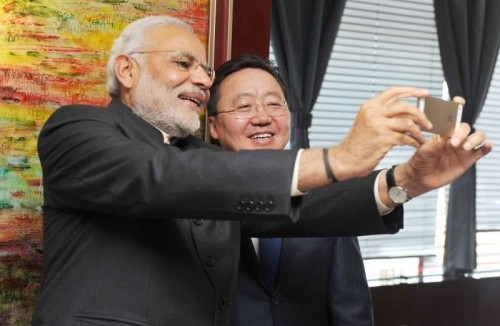
India and Mongolia elevated their 60-year-old diplomatic ties to a strategic partnership as Narendra Modi became the first Indian prime minister to visit the landlocked northeast Asian nation, which has declared India as its “third neighbour and spiritual neighbour”.
The two countries inked 13 agreements, including in the sphere of air services and cyber security.
Modi, who was accorded a ceremonial welcome in the morning and held talks with Mongolian Prime Minister Chimed Saikhanbileg, also visited the Gandan Monastery and presented a sapling of the revered Mahabodhi tree to the head abbot Hamba Lama of the monastery.
More than half the population of Mongolia, which is sandwiched between China and Russia and shares frosty ties with both, follows Buddhism.
Saikhanbileg, in his media statement after the talks at the State Palace, said Mongolia “firmly regards India as our third neighbour and our spiritual neighbour”.
Modi announced a $1 billion line of credit to Mongolia for its infrastructure projects. He said: “Mongolia is an integral part of India’s Act East Policy. The destinies of India and Mongolia are closely linked with the future of Asia Pacific Region.”
Modi thanked Mongolia for its “strong support” for India’s bid for permanent membership of the United Nations Security Council.
A joint statement issued here said India and Mongolia have agreed to offer reciprocal support for their bids for a non-permanent seat in the UNSC for the terms 2021-2022 and 2023-2024 respectively.
The government of India also confirmed its support to Mongolia’s candidacy to the UN Human Rights Council for the term 2016-2018.
“In a reflection of our commitment to further deepen our relationship, we have decided to upgrade our Comprehensive Partnership to ‘Strategic Partnership’. We also agreed to renew our Treaty of Friendly Relations and Cooperation,” he said.
Modi said India and Mongolia can boost cooperation in the field of civil nuclear as Mongolia is rich in uranium and in mineral resources. “I hope that location will not be a constraint on Mongolia’s right to choose its partners.”
In his address at the Mongolian parliament, or Great Hural, which was convened on Sunday as a special gesture in honour for the Indian prime minister, Modi said Mongolia terming India as its spiritual neighbour is a high form of honour.
There are “no bonds more sacred than this. We in India are honoured that you think of us this way”.
On terrorism, the joint statement said both prime ministers “noted that the nature and spread of international terrorism in recent years poses a threat to all humanity and requires global resolve and cooperative measures of the international community without double standards or selectivity”.
Both agreed to direct their officials to work together for the adoption of the Comprehensive Convention on International Terrorism.
The two prime ministers “expressed hope that all safe havens and sanctuaries for terrorists will be wiped out without delay”.
In the field of defence, both sides agreed to continue to work towards further intensifying bilateral defence and security cooperation through exchanges of high and mid-level visits, regular consultations, military personnel exchanges and capacity building among other things.
Among the memoranda of understanding (MoUs) is one for setting up a Cyber Security Training Centre in Mongolia’s defence ministry, as part of which India will train Mongolian personnel in cyber security.
The national security councils of both countries are to hold consultations on traditional and non-traditional security issues, counter-terrorism, intelligence cooperation and exchange.
Both sides also inked an MoU on enhancing cooperation between their border guarding forces in capacity building, exchange of best practices, conduct of joint exercises, technologies for border guarding, surveillance and policing.
Modi later handed over Bhabhatron, a telecobalt machine developed by the Bhabha Atomic Research Centre (BARC) for cancer treatment, at Mongolia’s National Cancer Centre here.
He also laid the foundation stone of the Atal Bihari Vajpayee Centre for Excellence in Information Technology & Communication and Outsourcing.
Modi met Mongolian President Tsakhiagiin Elbegdorj, who gifted him a morin khuur, a traditional two-stringed fiddle.
Modi presented Elbegdorj with a specially commissioned reproduction of a rare 13th century manuscript on the history of Mongols from the Rampur Raza Library, Rampur.